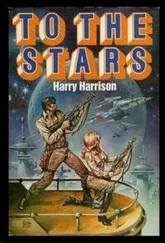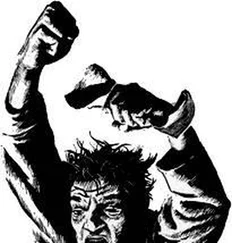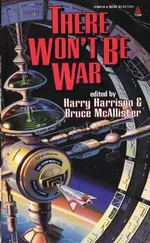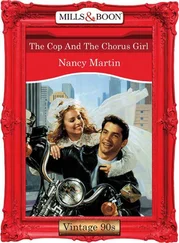The air of peace was totally deceptive, Brand knew. He was at the still center of the greatest storm in the North, its peace guaranteed only by hundreds of miles of war-torn sea and burning coastline. As they rowed in he had been challenged three times by naval patrols—heavy coastal warships never designed for the open sea, filled with men. They had let him through with increasing amusement, always keen to see a man try his luck. Even now two ships twice the size of his were cruising behind him, just to make certain there was no escape. He knew, his men knew, that worse lay ahead.
Behind him the helmsman passed the steering-oar to a crewman and strolled forward to the prow. For a few moments he stood behind his skipper, his head barely reaching the huge man's shoulder blade, and then spoke. He spoke softly, taking care not to be overheard even by the foremost rowers.
“You know I'm not one to question decisions,” he murmured. “But since we're here, and we've all stuck our pizzles well and truly in the wasps' nest, maybe you won't mind me asking why?”
“Since you came so far without asking,” replied Brand in the same low tones, “I'll give you three reasons and charge you for none of them.
“One: This is our chance to gain lasting glory. This will be a scene for sagamakers and for poets until the Last Day, when the gods fight the giants and the brood of Loki is loosed on the world.”
The helmsman grinned. “You have enough glory already, champion of the men of Halogaland. And some men say the ones we are going to meet are the brood of Loki. Especially one of them.”
“Two, then: That English slave, the runaway who told us the tale, the fisherman running from the Christ-monks—did you see his back? His masters deserve all the woe in the world, and I can send it to them.”
This time the helmsman laughed aloud, but gently. “Did you ever see anyone after Ragnar had finished talking to him? And those we are going to visit are worse. Especially one of them. Maybe he and the Christ-monks deserve each other. But what of all the others?”
“So, then, Steinulf, it comes to three.” Brand lifted gently the silver pendant which hung round his neck and lay on his chest, outside the tunic: a short-hafted, double-headed hammer. “I was asked to do this, as a service.”
“By whom?”
“Someone we both know. In the name of the one who will come from the North.”
“Ah. Well. That is good enough for both of us. Maybe for all of us. But I am going to do one thing before we get too close to the shore.”
Deliberately, making certain his skipper saw what he was doing, the helmsman took the pendant which hung round his own neck and tucked it inside his tunic, pulling the collar so that no trace of the chain showed.
Slowly, Brand turned to face his crew and followed suit. At a word, the steady beat of the oars in the calm water checked. The oarsmen shuffled chains and pendants out of sight. Then the beat of oars resumed.
At the jetty ahead men could now be seen sitting or strolling, never looking at the approaching warboat, giving a perfect impression of total indifference. Behind them a vast dragon-hall lay like an upturned keel; behind it and round it, a vast confusion of sheds, bunkhouses, rollers, boatyards on the edge of the fjord, smithies, stores, rope-walks, corrals, barracoons. This was the heart of a naval empire, the power center of men intent on challenging kingdoms, the home of the homeless warriors.
The man sitting on the very end of the jetty ahead of him stood up, yawned, stretched elaborately and looked in the other direction. Danger. Brand turned to shout orders. Two of his men standing by the halliards ran a shield up to the masthead, its new-painted white face a sign of peace. Two others ran forward and eased the gaping dragon-head off its pegs on the prow, turning it carefully away from the shore and wrapping it in a cloth.
More men onshore suddenly became visible, now prepared to look directly at the boat. They gave no sign of welcome, but Brand knew that if he had not observed proper ceremonial his welcome would have been very different. At the thought of what might have happened—might still happen—he felt his belly give an unaccustomed twinge, as if his manhood was trying to crawl back within him. He turned his face out to the far shore, to ensure no expression betrayed him. He had been taught since he could crawl, Never show fear. Never show pain. He valued this more than life itself.
He knew also that in the gamble he was about to take, nothing could be less safe than a show of insecurity. He meant to bait his deadly hosts, draw them into his story: appear as a challenger, not a suppliant.
He meant to offer them a dare so shocking and so public that they would have no choice but to take it. It was not a plan that allowed half measures.
As the boat nosed into the jetty ropes were thrown, caught, snubbed round bollards, still with the same elaborate air of carelessness. A man was looking down into the boat. If this had been a trading port he might have asked the sailors what cargo, what name, where from? Here the man raised one eyebrow.
“Brand. From England.”
“There are many men called Brand.”
At a sign two of the ship's crewmen swung a gangplank from ship to jetty. Brand strolled across it, thumbs in belt, and stood facing the dockmaster. On the level boards he was looking down. Far down. He noted with inner pleasure the slight shift of the eyes as the dockmaster, no stripling himself, weighed up Brand's bulk, realized that man-to-man, at least, he was outmatched.
“Some men call me Viga-Brand. I come from Halogaland, in Norway, where men grow bigger than Danes.”
“Killer-Brand. I have heard of you. But there are many killers here. It needs more than a name to be welcome.”
“I have news. News for the kinsmen.”
“It had better be news worth hearing if you disturb the kinsmen, coming here without leave or passport.”
“News worth hearing it is.” Brand looked directly into the dockmaster's eyes. “Come to hear it yourself. Tell your men to come and hear it. Anyone who cannot be bothered to hear what I have to say will curse his laziness till the last day he lives. But of course if you all have an urgent appointment in the privy let me not ask you to keep your breeches up.”
Brand brushed past the other and strode wordlessly toward the plume of smoke rising from the great longhouse, the hall of the noble kinsmen, the place no enemy had seen and left alive and free to tell the tale—the Braethraborg itself. His men trooped off the ship and silently began to follow him.
The dockmaster's lips twitched, finally, with amusement. He made a sign and his men, picking their spears and bows from concealment, began to straggle inland. A flag dipped in acknowledgement from the still-vigilant outposts on the headland two miles off.
Light shone into the hall from many open shutters, but Brand halted when he got inside to let his eyes adjust, to look around, to get the feel of his audience. In later years, he knew, this scene would be famous in song and saga—if he played it right. In the next few minutes he would gain either imperishable glory or unthinkable death.
Inside the hall many men were sitting, standing, loitering, playing at one game or another. None looked at him as he came in, or at the other men silently filtering in behind him, but he knew they had registered his presence. As his eyes cleared he saw slowly that though there was no apparent order in the hall, indeed a careful avoidance of it—a pretense that all warriors, all true drengir , were equal—still the groupings of the men were all subtly poised on one center. At the end of the hall, there was a little space no one ventured into. There four men were grouped, all seeming intent on their own concerns.
Читать дальше







